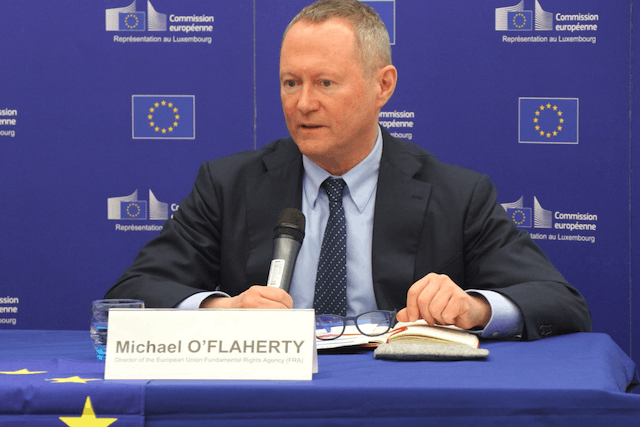The Vienna-based agency’s second survey on “Being Black in the EU” reveals that discrimination in Luxembourg in some ways is worse than the EU average. The survey focused on immigrants across 12 EU member states who were of sub-Saharan Africa origins. It found that the prevalence of perceived racist harassment in the five years prior to the survey was at 52% in Luxembourg, compared to the countries’ group average of 30%.
“There is a very strong tendency not to report the incidents,” O’Flaherty added. “In the EU, only 12% are reporting incidents, compared to 15% in Luxembourg.”
However, he says there is also a problem when it comes to awareness on the range of places people can go to complain: “EU-wide, 38% know of an equality body, here only 12%”.
Figures were somewhat better when it came to police engagement in Luxembourg. Of people stopped in the last five years, O’Flaherty says there is a slightly higher stop rate for Luxembourg (31% versus 26% for the EU average), but when asked whether they are being treated respectfully, 62% of respondents in the grand duchy said they were, compared to 59% on the average.
“Worrying” rise of antisemitism in EU
Luxembourg was included in the discrimination but not in the survey on antisemitism. O’Flaherty says this is because the Jewish population is too small in Luxembourg to guarantee anonymity. Nevertheless, he says that the survey “captures views of 96% of the Jewish population of Europe”.
He added: “The rise of antisemitism in Europe is really worrying for us right now.”
The survey results reveal that around 90% of Jews have experienced a direct act of discrimination, mainly online. “There’s a big problem in the public space, in the media and also public discourse,” O’Flaherty said, adding: “Jews are not reporting incidents, and this is very important because it means that official figures, which are based on reporting incidents, in no way correspond with the reality.” He says some 80% of cases are not reported.
Across the EU, per the study, some 38% of Jews are considerating emigrating due to concerns linked to antisemitism.
The EU Agency for Fundamental Rights publishes a handbook and offers tools to work with states and societies to address situations, and he says it is key to reinvest in education.
“The inevitability, the tragedy, is that there are fewer Holocaust survivors to tell their story, and we have largely relied on [them] to be the messengers to new generations. But we have to find a new way for the future,” O’Flaherty stated.
He added that Luxembourg is in “a natural leadership position to reengage this issue in the EU and more widely,” given the fact that the country took on the presidency of the International Holocaust Remembrance Alliance this year.
The populism link
The Vienna-based EU Agency for Fundamental Rights has also been publishing information about the migrant situation in Europe since 2015, looking at the most impacted EU member states in particular.
O’Flaherty says there has been a rise in intolerance and attacks on the migrant population. “We see more attacks on reception centres, more swastikas appearing on walls, more anti-Muslim rhetoric…it has to have a link with patterns of racism.”
He added that there’s “an obvious relation between populism… and the increasing ‘othering’ of groups in our society… it’s unacceptable and inadequately prosecuted.”
